There had been some arrangement by which the operator of the hotel was supposed to contact the police who would provide an escort. Thankfully he didn’t bother to do so and I was able to ride away on my own.
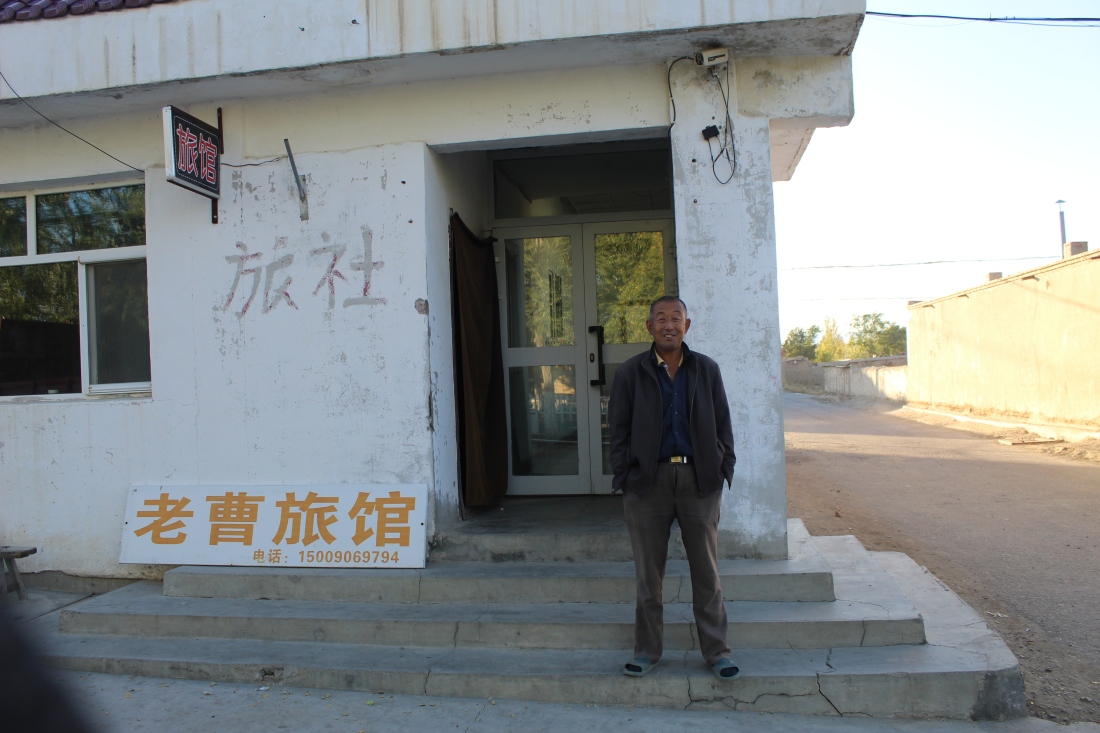 Once back on the main road I was soon out into the desert and climbing gradually upwards. A car passed me then stopped. Its occupants, a group of friendly and excitable Chinese tourists, got out of the car and greeted me. They gave me a bottle each of water and coffee, and we posed for a number of selfies. This was the sort of thing the police had been “protecting me” from yesterday!
Once back on the main road I was soon out into the desert and climbing gradually upwards. A car passed me then stopped. Its occupants, a group of friendly and excitable Chinese tourists, got out of the car and greeted me. They gave me a bottle each of water and coffee, and we posed for a number of selfies. This was the sort of thing the police had been “protecting me” from yesterday!
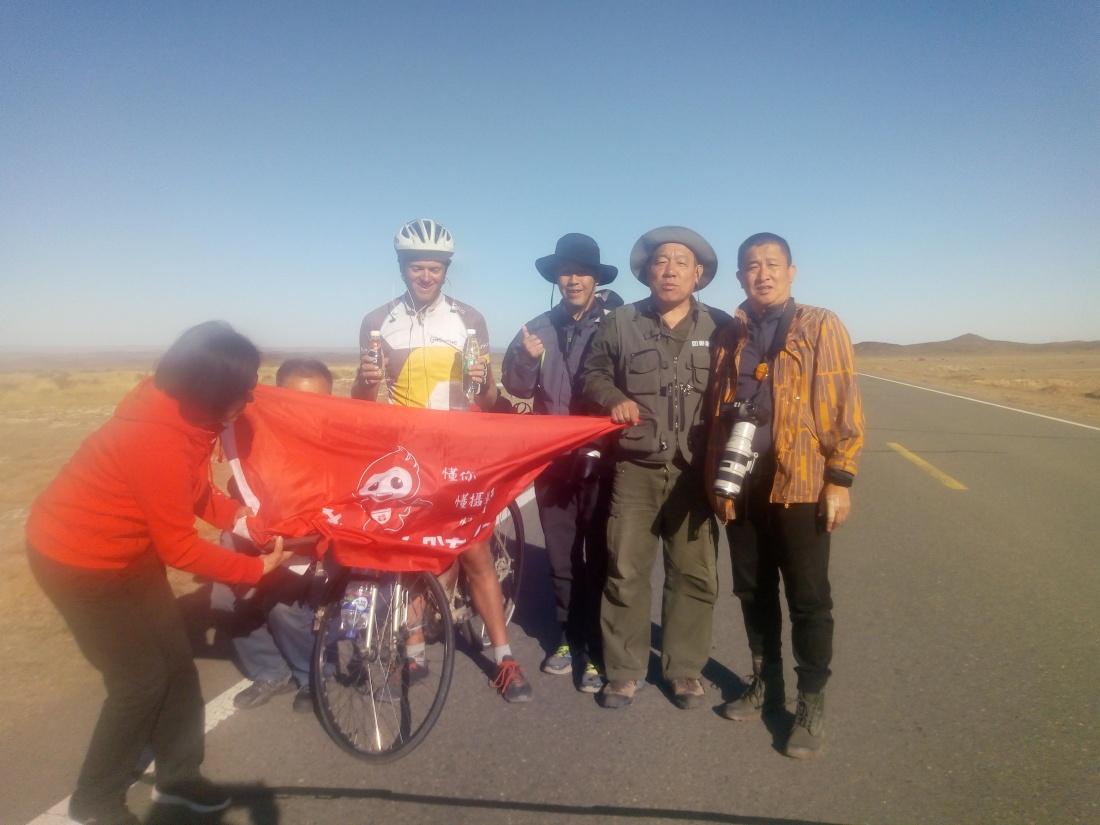
The hill I was climbing had been protecting me from the worst of the wind. Once the road flattened out, though, I felt the full force of the strong headwind. I was in the ridiculous position of going slower downhill than I had been while climbing! Once the road dropped a little bit lower there was some more protection and I was able to continue on at a more reasonable speed. I’d been riding for about 100 kilometres when I reached a checkpoint. It was described on iOverlander as a military checkpoint, but I saw only police there, though to be fair they were armed.
Once the road dropped a little bit lower there was some more protection and I was able to continue on at a more reasonable speed. I’d been riding for about 100 kilometres when I reached a checkpoint. It was described on iOverlander as a military checkpoint, but I saw only police there, though to be fair they were armed.
I was directed into the police building where one guy walked off with my passport to enter the details somewhere. Meanwhile, another guy asked for my visa. I had to explain that visas are found inside the passport his colleague had just wandered off with. Once that was sorted, I was sent into the body scanner then allowed to leave. There was a small shop nearby where I stocked up on water.
As I left the checkpoint, a car passed, slowed down to let me pass, passed me again, then slowed once more, this time gesturing for me to stop. While one of the occupants took photos, the driver very kindly handed me three bottles of water. This was particularly good timing as I was just about to start a long downhill. The water was therefore extra useful in that it provides extra handholds for gravity to pull me down the hill at speed. That’s physics for you.
This very gradual descent levelled out after a couple of hours, shortly store a crossroads. I’d been planning on turning west, which would have been a somewhat shorter route, but changed my mind on seeing the amount of traffic. The east-west road had a constant stream of trucks so I instead to decided to continue southwards. I rode only a little while further before setting up camp in a storm drain.
It was a rather warm night. I’d now descended to an elevation of about 500m, in the Qitai desert. The lowest temperature I saw on the thermometer was 16°C. Quite a change from last time I camped, four nights earlier, where my water froze!
After a couple hours riding, I passed what seemed to be a large trucker’s rest area. For a stretch lasting about a kilometre the road was lined with cafes and mechanics, with large numbers of lorries parked outside.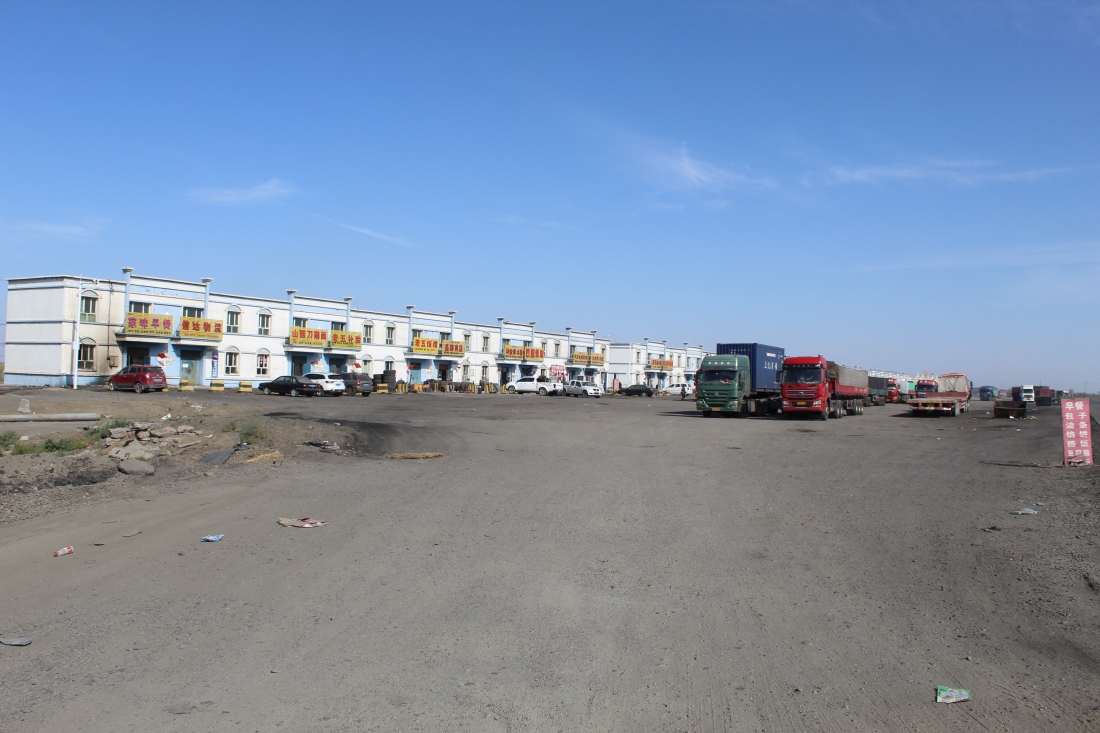 Shortly past this there was a strange sort of town. Mostly formed of large apartment buildings set slightly back from the highway, there was also a long line of small shops. I stopped at a couple of these to see if any would accept credit cards. I still hadn’t been able to get money in China, and was now on my third day of living off the one day’s worth of supplies I’d bought in Mongolia!
Shortly past this there was a strange sort of town. Mostly formed of large apartment buildings set slightly back from the highway, there was also a long line of small shops. I stopped at a couple of these to see if any would accept credit cards. I still hadn’t been able to get money in China, and was now on my third day of living off the one day’s worth of supplies I’d bought in Mongolia!
Unfortunately none of the shops would take western cards. Most payment here seems to be done via an app: the payer scans a QR code in the shop, enters a payment amount, then demonstrates the confirmation screen to the payee. I of course did not have this app.
Some police showed up while I was looking around. Their uniforms proclaimed them SWAT though I saw no weapons, special or otherwise. They didn’t seem to have a great deal of training either, though they were friendly. While one checked !y passport (and was confused by the multiple pictures – the main photo and a few visa photos), another brought me a couple of bottles of water and the third phoned a bank in Qitai, the next largish town, to confirm that I’d be able to exchange money there.
I had just got a puncture so I repaired that while the police busied themselves with my passport. A second group arrived, who insisted on checking the passport as well. Eventually my puncture was fixed and I was allowed to ride away.
I turned off on a minor road towards Qitai. Rather than the deserts that I’d mostly been cycling through since entering China, there was now some farmland and a few villages. A small town near Qitai had a bank. Like most semi-official buildings in the region, it was fortified – concrete, barbed wire fence, riot police. I wasn’t able to withdraw money but I did get directions to the bank in Qitai that would serve foreigners. Continuing on, a passing car stopped and the occupants greeted me, and gave me a bottle of water. At this rate I wouldn’t even need to withdraw money!
On the way into the city there was a police checkpoint. Communication with the police is usually done via translation apps. One of the messages here was “don’t stay in Qitai.” I’m not sure if this was a command or possibly a question, “you’re not staying in Qitai?” Either way I gave the name of another town and said I would be going there. Eventually I was allowed through.
I made my way to the bank and managed to withdraw money – finally I could buy food! The area around the bank was very busy. It seemed like the schools had just finished, as there were hundreds of kids in their red uniforms.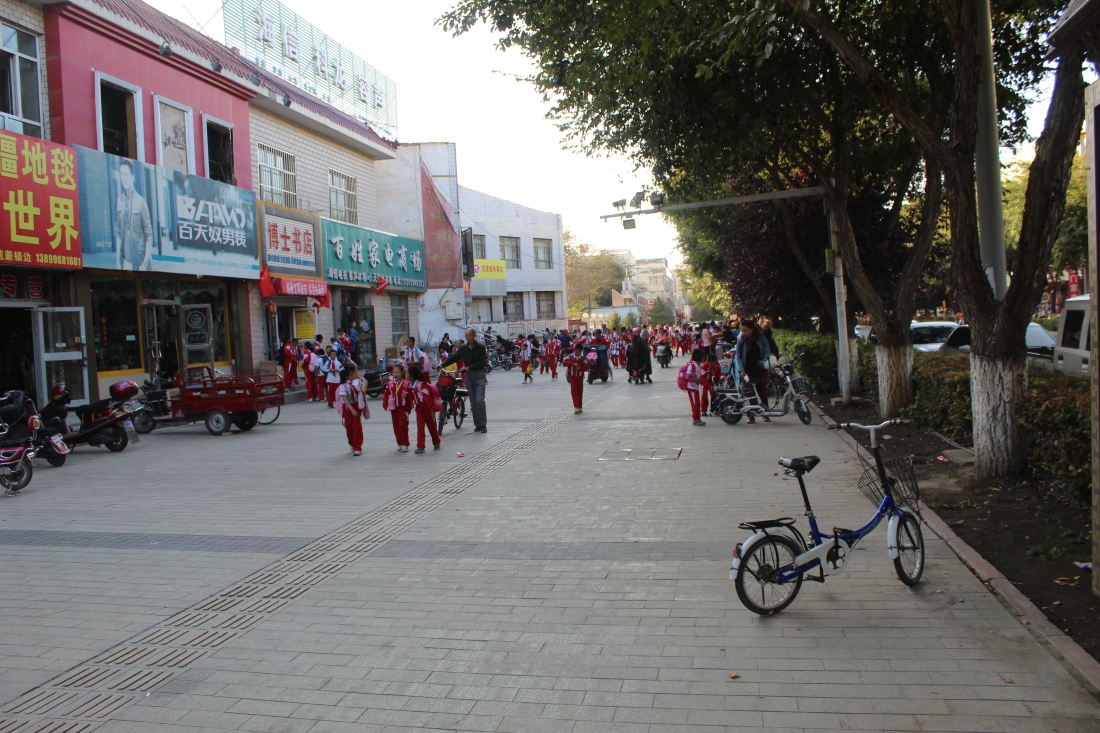 I tried to pick up a sim card but neither of the shops I tried would allow me to do so without a local ID card. I decided I’d try again in Urumqi, a large city which seemed likely to have better provision for tourism. After visiting a shop I made my way out of Qitai and onto a dirt road leading through some farms. There was a large overgrown patch between two sections of maize. I made my way in there and set up camp. The overgrowth was long enough that I was invisible from the road.
I tried to pick up a sim card but neither of the shops I tried would allow me to do so without a local ID card. I decided I’d try again in Urumqi, a large city which seemed likely to have better provision for tourism. After visiting a shop I made my way out of Qitai and onto a dirt road leading through some farms. There was a large overgrown patch between two sections of maize. I made my way in there and set up camp. The overgrowth was long enough that I was invisible from the road. It was an unusually quiet area so I slept well, aided by a good supply of food that had been rare for the last few days. In the morning I rejoined the main road after a couple of kilometres, and reached a checkpoint within an hour or so.
It was an unusually quiet area so I slept well, aided by a good supply of food that had been rare for the last few days. In the morning I rejoined the main road after a couple of kilometres, and reached a checkpoint within an hour or so.
It took quite a while for the police at this checkpoint to figure out what to do with me. I was told to sit and wait for some times until eventually some plainclothes police arrived. I was told they would be escorting me. They took my passport, presumably to ensure my cooperation.
In contrast to the police on the first day, these guys insisted on driving in front. They would drive for a while, stop and wait, then drive on ahead. Since they were in an unmarked vehicle this erratic behaviour earned them a lot of honking from the rest of the traffic on the road.
They insisted on diverting me from the secondary road to the highway. There was a sign stating no bicycles, and a group of police there who sought to enforce that. After some conversation between the highway police and my escort, I was shown the message “bicycles are not allowed on the highway in China.” I translated back “I don’t want to go on the highway. They made me come here,” pointing at my escorts. I was taken inside, given some water, and told to wait.
Eventually I was allowed to return to the road I’d originally been on. The one positive outcome of this affair was that I’d managed to reclaim my passport. Now if my escort got separated it would be their problem, not mine.
They did indeed disappear for a while. After a few kilometres, I was stopped by two oncoming vehicles. One swung in behind me to block my retreat, while the other turned dramatically to park perpendicularly to the road, blocking the advance. It seemed somewhat over the top; they could just have waved for me to stop.
This second car wanted to check my passport; in fact they insisted on taking photographs of every stamp therein. This took a while but once it was done I was allowed to go, and saw no more of them.
Once I was confident I wasn’t being followed, I stopped at a storm drain and hid under the road for a long lunch break. After a couple of hours resting, I returned to the road and cycled for a few more hours before stopping for the day.
The next morning I set off early for what would be a final day of riding into Urumqi, where I planned to have a few days of rest. After a brief descent the road levelled out and I entered an urban area centred on the town of Fukang. Here was the first checkpoint of the day.
As usual there was some confusion about how to deal with me. The locals scan their ID card, which is linked to them by facial ID. They pass the checkpoint in a few seconds. The police seem unused to dealing with foreigners, though, and it takes them some time to figure out a procedure. Each checkpoint has its own peculiarities. Here I was asked for registration information for the previous night (presumably for a hotel). I had no such registration but was eventually let through regardless.
On the way out of the urban area there was another checkpoint. Here I was asked for my bus’s number. Usually they are able to deduce, from the lycra and cycle helmet, that I’m riding a bike! Apart from that it was quick and I was on my way within a quarter of an hour.
I rode a further ten kilometres or so to the third checkpoint of the day, which represents the outer boundary of Urumqi’s sprawl. Here for the first time I was asked for information of the hotel where I planned to spend the night. Fortunately this was the first day where I actually had this information. Again this one was pretty quick and I was back on the bike after not much more than ten minutes.
Here the road started to climb. There were about ten more kilometres through barren desert, before I arrived in the enormous urban area that surrounds Urumqi – I would be cycling 35km further before reaching my hostel in the centre. By Chinese standards Urumqi is considered a small city, with a population only slightly higher than that of Wales at 3.5 million.
As the traffic density increased I moved over on to the bike/pedestrian paths, which were of reasonable quality as such things go. Once into the city centre I could see that the city was significantly different to those I was used to, primarily in its sheer verticality. In Europe tall buildings are rare. Here they were everywhere. I arrived at the hostel, checked in at around midday and took three days off there. I spent the first couple of days on a variety of tasks I’d been wanting to complete. My effort to get a SIM card was unsuccessful – I was told that in Xinjiang an ID card was required. Since the WiFi at the hostel required a Chinese phone number to access, I found a restaurant with WiFi which I went to whenever I needed to use the internet.
I arrived at the hostel, checked in at around midday and took three days off there. I spent the first couple of days on a variety of tasks I’d been wanting to complete. My effort to get a SIM card was unsuccessful – I was told that in Xinjiang an ID card was required. Since the WiFi at the hostel required a Chinese phone number to access, I found a restaurant with WiFi which I went to whenever I needed to use the internet.
I had more success at the bike shops. I bought a new chain and cassette, replaced both tyres, as well as a few other smaller things I needed to do. I went to the bike shop with Jan, a Germa cyclist I’d met at the hostel. For once I wasn’t the one being stared at: the Chinese were fascinated by the sight of this 206cm (6ft 10) European.
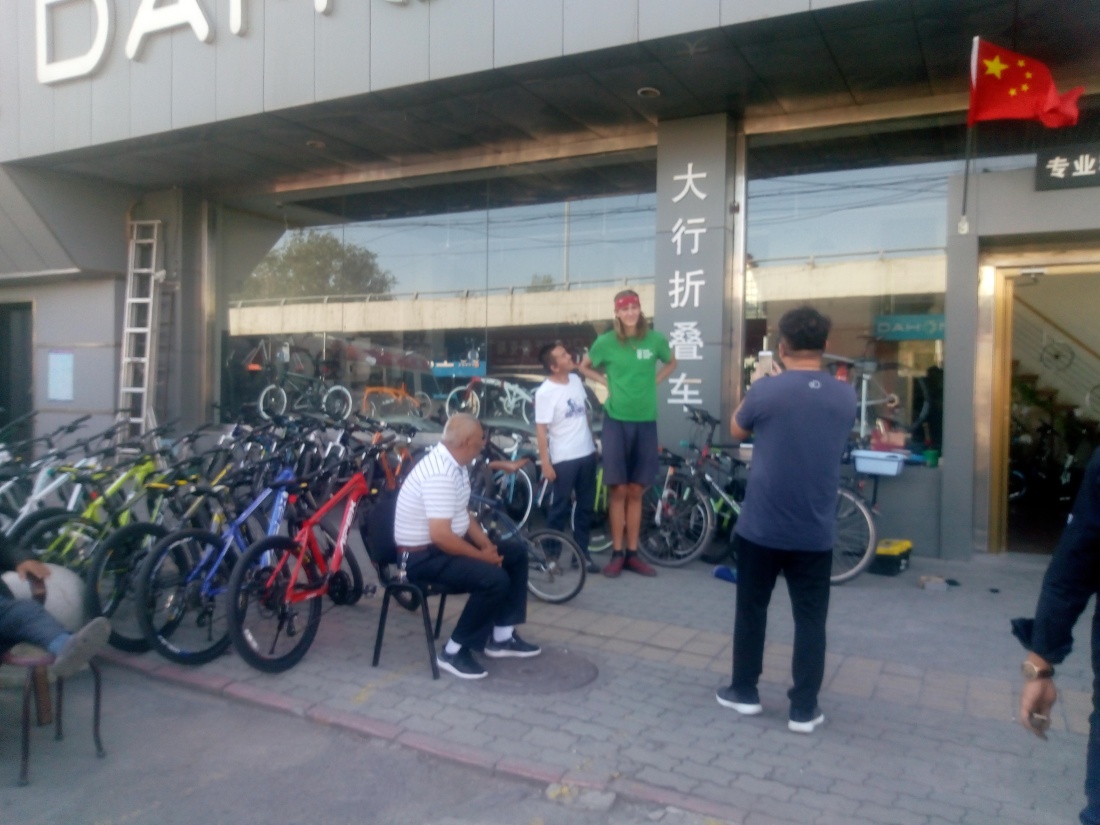
There were a variety of other things I got done, such as some repairs to clothes and to my handlebar bag. With my long list of tasks complete, I spent my third day off in relaxation at the hostel.

September 19th: 168 km
September 20th: 122 km
September 21st: 96 km
September 22nd: 98km
Great blog, I was laughing through much of it.
Love dad
LikeLike
Very interesting, I’ve been telling my students all about you!
LikeLike
Good things I hope! Did any of your Chinese students comment on the situation?
LikeLike